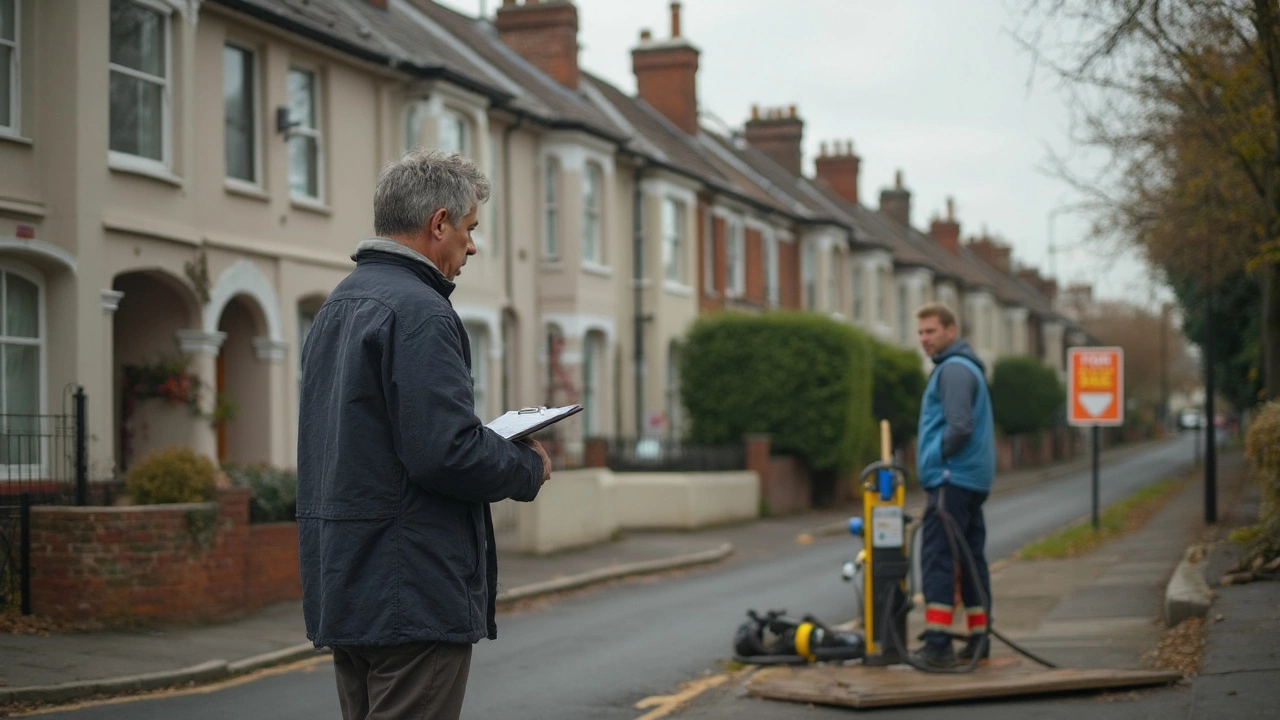Picture this: you spot cracks in your walls, maybe a door that won't shut right. Instantly, you start worrying—not just about the repair bill, but about what it means for your home’s value. If you fix it, will buyers run the other way? Or do you risk losing out even more if you don’t?
Here’s the straight talk. Foundation issues freak buyers out. That part’s no secret. But in most cases, leaving problems untreated is what really tanks your home’s value. When you get professional repairs—especially with a solid warranty—it actually reassures buyers. They can see you did the responsible thing and tackled the problem head-on, instead of sweeping it under the rug.
Your approach matters though. Just fixing the cracks isn’t enough. Documentation and smart choices during the repair process make a world of difference. Stick around for tips on picking trustworthy contractors, what to disclose, and simple ways to get the most bang for your buck after you invest in repairs.
- Why Foundation Problems Matter to Buyers
- Can Repairs Affect Home Value?
- Disclosures: How Much Should You Reveal?
- Timing and Choosing the Right Contractor
- Tips to Maximize Value After Repair
Why Foundation Problems Matter to Buyers
When potential buyers walk through a house, the word “foundation” could make or break their interest. It’s not just about looks—foundation problems hint at bigger worries hiding beneath the floors: safety, cost, and future headaches. Buyers know repairs can get expensive fast. In 2024, HomeAdvisor pegged the average foundation repair at $4,500, with some jobs running well over $10,000 if the damage is severe or needs major structural fixes.
But there's more going on here. When lenders order appraisals, foundation concerns almost always trigger red flags. Banks hate risk. If the home has unresolved foundation problems, buyers might not even get approved for a mortgage. Or the lender could demand repairs as a condition before they’ll sign the loan papers.
There’s also the home inspector to think about. Most buyers hire inspectors before they buy, and foundation trouble is high on their checklist. Common red flags include:
- Stair-step cracks in brick or concrete block walls
- Doors or windows that stick or don’t close
- Sloping floors
- Separation between walls and ceilings or floors
All these signs make buyers either push for a big price drop, or walk away entirely.
Here’s a quick look at why foundation repair concerns can have such a big bite at resale:
| Issue | How Buyers React |
|---|---|
| Visible cracks or sloping floors | Lower confidence, often offer less money or avoid property |
| Unfixed foundation damage | Requests for repairs before closing, may back out |
| Documented professional repairs | Higher trust, easier mortgage approval |
For anyone thinking about selling, it’s clear why buyers are wary of foundation issues. A properly repaired foundation repair with all the right paperwork helps buyers feel like they’re not about to inherit a money pit.
Can Repairs Affect Home Value?
This is one of those questions that makes every homeowner sweat. Will spending money on foundation repair mess up your bottom line when it’s time to sell? Here’s how it actually breaks down.
First off, let’s be clear: untreated foundation problems almost always foundation repair lowers property value a lot more than getting them fixed. A 2023 survey by the National Association of Realtors showed that homes with obvious structure problems sold for up to 20% less than similar homes with repairs done. Buyers tend to walk away from homes with foundation red flags, or they’ll make lowball offers because of the risk.
Repairing foundation issues doesn’t usually increase your home value like, say, adding a new kitchen would. But making those repairs can help you keep your value stable. Think of it as damage control—stopping your home from losing even more value.
Here are some facts you should know:
- If foundation repairs are done professionally (with a warranty), most sellers get back 80% to 100% of what they spent when they sell their house.
- Pier and beam repairs are less likely to hurt value than older-style slab repairs, since modern methods are more reliable and less invasive.
- Big red flag: DIY patch jobs or using a cheap contractor can end up hurting your value anyway. Buyers will spot corner-cutting a mile away.
Check out this quick snapshot of how buyers and realtors view homes with recent foundation work, according to HomeLight’s 2024 Top Agent Insights Report:
| Type of Repair | Impact on Sale Price | Buyer Willingness |
|---|---|---|
| Professional, warranted repair | Stable (0% to -5%) | High |
| DIY/cheap fix | -7% to -15% | Low |
| Unrepaired foundation | -10% to -20% | Very low |
The real game-changer: repairs done by a respected contractor with paperwork to back it up. That’s what keeps your home’s value from slipping. It answers the big question buyers have—“Has this been fixed for good?”

Disclosures: How Much Should You Reveal?
No matter how tempting it is to hold back details, being upfront about foundation repair is not just smart—it's legally required in most states. Real estate disclosure laws usually mean you’re on the hook for telling buyers about any past or current foundation issues and repairs. If you try to hide it, you risk lawsuits down the road that can cost way more than the repair itself.
Buyers want to know what happened, if it’s been properly fixed, and who did the work. Transparency actually increases trust. A 2024 Home Buyers Association study found that homes with fully disclosed, professionally repaired foundations sold almost as fast as those with no foundation history at all.
- Provide repair invoices and any engineer or contractor reports.
- Offer top-level warranty info—backed by the company, not just the contractor.
- Explain what caused the issue and how it was fixed.
- Be ready to answer follow-up questions or provide more documents if asked.
Check out how disclosure affects real sales below:
| Disclosure Type | Median Days on Market (2024) | Average Price Adjustment |
|---|---|---|
| Full documentation+transferable warranty | 39 | -2% |
| Minimal disclosure/no warranty | 61 | -7% |
| No disclosure (found later) | 90+ | -15% (legal risk) |
Clearly, the more you share—and the more proof you offer—the less your sale is likely to take a hit. Besides, if buyers sense you’re hiding something, they’ll usually walk or demand a bigger discount. If you’re not sure about your state’s rules, talk to a local real estate agent or real estate attorney before you list.
Timing and Choosing the Right Contractor
Letting foundation problems sit is a risky move. The longer you wait, the worse things can get—more cracks can show up, doors get harder to close, and repair costs often climb. A 2023 survey by the Concrete Foundation Association showed homes with untreated foundation issues sit on the market twice as long as those with documented repairs. Acting quickly isn’t just about fixing your house—it’s about keeping it sellable.
So, how do you pick the right contractor without getting burned? You want a company with a proven track record, full insurance, and real certifications. Always ask for referrals and read online reviews. Don’t just take the first quote you get. Compare pricing, but never pick the cheapest offer just to save a quick buck. Cheap fixes can backfire when buyers spot shoddy work or missing paperwork.
- Check if the contractor offers a transferable warranty—this reassures buyers down the road.
- Get all details in writing, including costs, scope, and timeline.
- Ask if they’ll provide a detailed repair report at the end of the job. This helps a lot when it’s time to sell.
Timing matters, especially if you’re thinking about selling soon. Fixing issues before listing almost always gives you a stronger position. Real estate agents even say homes with recently repaired foundations—and all the receipts to prove it—can avoid big price drops during negotiations. If you’re serious about protecting your foundation repair investment, fast action and the right team make all the difference.

Tips to Maximize Value After Repair
So you’ve tackled your foundation problems—now it’s about making sure your house shines for the next buyer. Getting the repair done is just step one. If you play your cards right, you can actually boost your home value and calm buyers’ nerves at the same time.
The first thing buyers want to see is proof. Always keep a complete file: contracts, before-and-after photos, engineer’s reports, and, most importantly, the warranty. According to HomeLight’s 2024 survey, homes with transferrable foundation warranties sell up to 10% faster. You want to show that the issue was fixed for good, not just covered up.
- Show off that warranty. Highlight the transferrable warranty and put copies in an easy-to-find folder for showings or open houses.
- Finish the job right. If you’ve had jacking or piers installed, make sure all cosmetic repairs—like patching cracks and repainting—are finished so the place looks move-in ready.
- Be transparent—but not alarmist. Don’t hide the problem, but don’t oversell it either. Explain what was found and how it was fixed. Share documentation up front. In many states, you’re legally required to disclose foundation repairs anyway.
- Keep curb appeal strong. Studies from the National Association of Realtors say first impressions set the tone for the whole sale. Make sure your landscaping is tidy and your entry looks good—no evidence of past shifting or settling visible outside.
- Market the upgrade angle. If you updated other parts of the house while fixing the foundation (maybe new floors or drainage), highlight these upgrades as value boosters.
Here’s a breakdown of what buyers care about most, based on a 2023 Redfin study:
| Buyer Priority | Percentage Who Care |
|---|---|
| Proven repair & warranty | 68% |
| Good curb appeal | 56% |
| Clear disclosures | 51% |
| Cosmetic repair completed | 44% |
One more thing: try to get a post-repair inspection by a licensed engineer. Buyers feel a lot better when an independent expert signs off. It’s a small added cost but helps big time during negotiations.
Nail the details, organize your paperwork, and let buyers know you took good care of business. That’s the combo that protects—and maybe even bumps—your property’s value after foundation repair.





